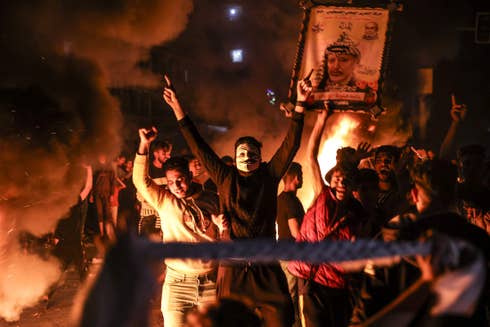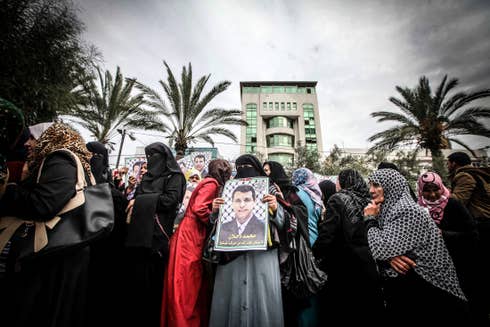Canceling the Palestinian Elections Is Patronizing, Unjust—and Dangerous


Orinoco Tribune – News and opinion pieces about Venezuela and beyond
From Venezuela and made by Venezuelan Chavistas

By Muhammad Shehada – Apr 26, 2021
Israel and the Biden administration back the superannuated, autocratic Palestinian President Mahmoud Abbas’ attempts to walk back his decision to hold elections later this month. But canceling the vote has catastrophic risks.
No one really thought Palestinian Authority President Mahmoud Abbas would set a date for general elections, after 15 years of indefinite procrastination.
But his formal decree last January surprised and puzzled Palestinians and observers alike, not least when the big three threats to the status quo—Trump’s unconstrained assault on the Palestinian cause, Israel’s annexation and an Arab stampede on the Palestinians—have subsided, for now.
Speculation and anecdotal evidence had combined to offer the explanation that the octogenarian Abbas – in office 12 years past his term limit—kickstarted Palestinian democracy due to pressure from the European Union, or as part of a bid to appease the new Biden administration.
RELATED CONTENT: On Palestine Children’s Day, 140 Minors Held in Israeli Prisons
Now, that very administration is hinting to Abbas to postpone the elections. The reasons are piling up for him to cancel his performative gamble: to hold on to power, without the inconvenience of elections.
Abbas had a unique chance to reunify Fatah, ramp up its inclusivity, make up for past mistakes, and revive ties with Fatah’s base. He had a chance to avoid repeating the 2006 elections when Fatah divided into two slates, costing it dearly. But in the contest between a strategy for Fatah’s survival and Abbas’ ego, the interests of the king of the Muqata were always going to win.
So Abbas instead threatened anyone not toeing the official Fatah line or standing on breakaway slates would be stopped by force, or even killed. But Abbas soon realized he couldn’t enforce his arrogant demand for exclusivity.
Ironically, Abbas himself stoked the appetite for defectors, thanks to the manner in which Fatah’s official slate was formed. It was a textbook example of patronage, nepotism, manipulations, and intolerance to dissent. Many prominent voices, deemed critical or disloyal to Abbas and his entourage, were disqualified or overlooked. Others were given meaningless places at the end of the slate.
This stirred grievances, fueled internal divisions, and prompted nine Fatah leaders to drop off the slate after its official submission. Nasser al-Qidwa and Marwan Barghouti— two of Abbas’ top Fatah rivals, who enjoy the support of his ultimate enemy, Mohammed Dahlan—united in one slate co-led by Al-Qidwa and Barghouti’s wife, Fadwa, to protest of Abbas and his inept manner and choices.

Together with Dahlan’s own “Reform Current” slate, Abbas is right to worry about losing a sizeable chunk of his prospective voters, especially in Gaza where they’re campaigning big-time.
Hundreds of Dahlan’s men—who haven’t stepped foot in Gaza for 14 years, including infamous leaders of the preventative security force and his “death squad“—have recently been swarming on Gaza. With open arms, Hamas has been welcoming the very people it blamed for the 2007 blood-soaked events in Gaza that ignited Palestinian divisions after Israel’s withdrawal.
And Hamas itself isn’t playing fair. It knows its chances of pulling off a 2006-like electoral miracle in Gaza are slim, so it has resorted to astroturfing. It is propping up a whole range of candidates, from Hamas loyalists, to sympathizers redressed as independents, from prospective representatives legitimized by their hostility to Abbas to grassroots activists, all in order to spread its risk and invest in future leverage without grouping all those candidates under its own flag.
Meanwhile, Hamas’ official slate is based on abstract moral posturing and emotive imagery. It panders more to West Bank Palestinians and its base by placing at its forefront a number of prominent ex-prisoners, such as Jamal Abu Al-Hayja, the leader of the 2002 battle of Jenin, or Ramallah’s Nael Al-Barghouti, the longest serving Palestinian political prisoner in Israeli jail.

Although Hamas initially committed to a slate adorned with fresh new faces, knowing how loathed the old faces are, the final slate looks more like a compromise between the movement’s different wings. It includes senior leaders and old-time opportunists, but also moderates, technocrats, academics, women, youth and even, for the first time ever on an Islamist slate, Palestinian Christians.
These are all intimidating reasons for Abbas to ditch the elections, seeing that the odds are stacked against him. But the deciding factor as to whether elections will be held or not lies out of his hands: with Israel. And it all revolves around Jerusalem.
Abbas declared early on that East Jerusalem Palestinians must be allowed to vote. This is a moral red line that no Palestinian party can dispute publicly, even if they know Abbas is using Jerusalem as a pretext for potential cancellation.
The centrality of Jerusalem to all the slates cannot be overemphasized. Every electoral slate incorporates several Palestinian Jerusalemites. Fatah’s slate notably includes Al-Aqsa Mosque preacher, Sheikh Yousef Salama, while the Hamas slate’s official name is the emotive though unwieldy “Jerusalem is our Promise (or Rendezvous).”
RELATED CONTENT: Palestinians Called Israel an Apartheid State Decades ago
As an aside, one keen-eyed observer noticed the Hamas campaign logo, a somewhat bucolic image of the Dome of the Rock with no weapons in sight, was a direct knock-off of a stock image used for “Made In Israel” products.
And current events in Jerusalem pack a punch.
When, last week, Palestinian Jerusalemites took to the streets to protest Israeli restrictions and Netanyahu’s new anti-Arab Kahanist partners marched through the Old City, with police bias and brutality leading to 100 wounded Palestinians, every Palestinian party issued denunciations. They scrambled to issue grander statements than the last in support of—or taking credit for—the demonstrations, while Hamas loosened its grip on other armed groups in Gaza, leading to the firing of rockets over the border and a violent escalation with Israel.
Israel has still not responded to the PA’s request to hold elections in Jerusalem; it has also prevented Palestinian candidates from holding rallies or press conferences in the city, and even arrested several candidates. Israel has threatened and arrested Hamas candidates across the West Bank, although it pledged not to sabotage the election.
For Abbas, having Israel to blame for nixing East Jerusalemites voting is a perfect result, a convenient, dignified and righteous reason to postpone elections indefinitely. And things seem to be moving this way.
Meanwhile, the Biden administration is hardly fighting hard for the renewal of Palestinian democracy. It effectively told Abbas it would look the other way if elections are postponed.
And Israel is escalating its opposition. The head of Israel’s Shin Bet told Abbas directly to cancel elections because of Hamas will participate in them and drew a red line at a possible joint Hamas-Fatah government (an inescapable eventuality after elections).
Israel’s army has recently raised the level of preparedness to suppress protests that would immediately ensue if elections are cancelled, and Dahlan’s men, who opportunistically descended on Gaza, have smelled the change of atmosphere and are now leaving again, one by one.

But those in the U.S. and Israel who advocate cancelling the elections are making a disastrous mistake. And that mistake goes further than the weighty decision to deprive Palestinians of their fundamental right to vote.
If those elections are cancelled or postponed, there won’t be any further attempt to hold them in the near future (at least as long as Abbas lives). There would be no chance of holding another round of election that would be similarly canceled because of the unlikely chance Hamas would win straight out.
Canceling the elections would also further undermine the legitimacy of the “anti-democratic” PA and empower Hamas further, entrenching its rule in Gaza and elevating their narrative as the moral superior to Fatah, because they endorsed a democratic process, but Abbas ran away.
Canceling elections would further the dangerous despair and hopelessness amongst Palestinians, who would face the inescapable fact that their very last chance for unity or action has also proven futile.
The catastrophic risks of canceling elections by far outweigh those of holding them. No matter how ominous some may see the picture right now, there are still solid opportunities.
Hamas fully understands, and agrees, at least quietly, that any future government will at minimum have to endorse the two-state solution, non-violence, and international law, and the movement pledged not to fill the posts of Prime Minister or Foreign Minister to avoid an international veto.
More importantly, Abbas is deliberately misreading the political map and misleading interested parties about the electoral fortunes of Fatah as a broad, secular nationalist movement. With the new proportional representation electoral system, no vote will go to waste; all three Fatah slates are likely to make it. In fact, the Barghouti/Qidwa slate might be the best chance to prevent a Fatah defeat, given Barghouti’s overwhelming popularity and Qidwa’s decency and professionalism.
Their slate represents an appealing third choice for Palestinians disaffected with both Hamas and Abbas, corruption and nepotism. If Abbas could put aside his ego, he would see that the Fatah breakaway slates complement ‘Official Fatah’ and strengthens the pragmatic, secular camp.
If Fatah is to survive and win, Abbas should shake himself out of his feeling of entitlement to all Fatah votes and stop intimidating voiceless salaried employees into voting for him. Instead he should welcome dissenting voices, revoke all measures he took against Al-Qidwa and prepare for coalition building with him.
Muhammad Shehada is a writer and civil society activist from the Gaza Strip and a student of Development Studies at Lund University, Sweden. Twitter: @muhammadshehad2
Feature image: Palestinian President Mahmoud Abbbas is walking back his decision to hold elections. With Jerusalem as a pretext, he hopes to hold on to power, without the inconvenience of seeking popular legitimacy. Credit: Mohamad Torokman/Reuters.
SL
You must be logged in to post a comment.